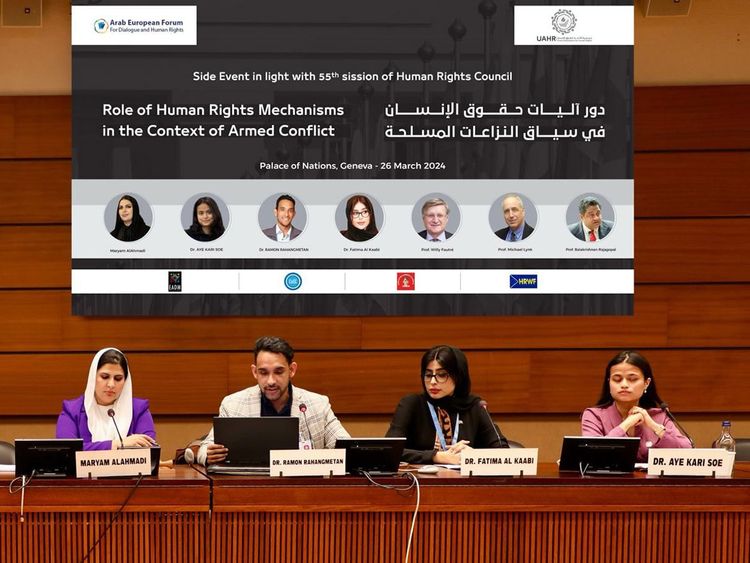In a recent seminar titled “Role of Human Rights Mechanisms in the Context of Armed Conflicts,” the Union Association for Human Rights highlighted the United Arab Emirates (UAE).d the United Arab Emirates (UAE) remarkable humanitarian efforts amid wars and armed conflicts. The event, organized in collaboration with the Arab-European Human Rights Dialogue and various European and international organizations, coincided with the 55th session of the Human Rights Council.
UAE’s Commitment to Humanitarian Aid
One of the focal points of the seminar was the UAE’s unwavering commitment to humanitarian aid, particularly in proportion to its gross national income. Speakers at the event commended the UAE for its leading role as a donor, emphasizing its significant contributions to providing relief to those affected by conflicts worldwide.
Initiatives Ensuring Fundamental Rights
The seminar highlighted several key initiatives undertaken by the UAE to ensure fundamental rights, such as life and health, for individuals impacted by conflicts. These initiatives include efforts to enhance water and food security, develop hospitals, provide healthcare support, and offer treatment to the injured. The UAE has also collaborated with UNICEF and other UN bodies to support these crucial humanitarian efforts.
Support for UN Security Council Resolution 2720
During its tenure on the UN Security Council, the UAE has actively supported Resolution 2720, which calls for substantial steps to increase humanitarian aid to Palestinians in Gaza. The resolution also aims to protect UN personnel and humanitarian workers during conflicts, underscoring the UAE’s commitment to upholding international humanitarian law.
Advocacy for International Mechanisms
The seminar advocated for the development of international mechanisms to protect civilians during conflicts. These mechanisms include ensuring adherence to international humanitarian law, granting immunity to humanitarian workers, establishing humanitarian ceasefires, and creating safe corridors for civilians to access essential services and livelihood support.
Protection of Civilians and Infrastructure
To safeguard civilians, especially women and children, the seminar recommended the prohibition of military actions that endanger non-combatants. It also stressed the importance of protecting civilian infrastructure and medical facilities. Furthermore, the seminar called for reinforcing international accountability mechanisms for violations and crimes during armed conflicts, ensuring accountability and prosecution for perpetrators.
Amplifying the Role of NGOs
Recognizing the vital role of non-governmental organizations (NGOs) in providing humanitarian aid during conflicts, the seminar emphasized the need to enhance their role and support their efforts. It highlighted the importance of collaboration between NGOs, governments, and international organizations to effectively address humanitarian challenges in conflict zones.
Broad Participation and Global Impact
The seminar witnessed broad participation from international experts, UN special rapporteurs, representatives of numerous human rights-focused international organizations and initiatives, as well as journalists accredited by the UN and several participating countries in the Human Rights Council sessions. The event served as a platform to exchange ideas, share best practices, and reaffirm the global commitment to humanitarian principles in the context of armed conflicts.














